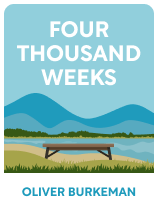

This article is an excerpt from the Shortform book guide to "Four Thousand Weeks" by Oliver Burkeman. Shortform has the world's best summaries and analyses of books you should be reading.
Like this article? Sign up for a free trial here .
Do you feel like you’re not making the most of your time? Do you often engage in time-wasting activities that yield neither value nor enjoyment?
If you feel like you’re wasting your time, you probably are. Life is short and youth is even shorter, which is why you should make the most of it. To that end, be careful how you spend your time or it will slip away like sand through your fingers.
Here’s how to use your time wisely.
Making the Most of Your Time Alive
Your life is finite and extremely brief in the context of the universe. If you live to be 76, you’ll only have about 4,000 weeks on Earth. The implication of a finite life is that you must use your time carefully and in service of projects and activities that matter to you and make you happy.
Here are three suggestions to make wiser use of your time:
1. Prioritize the Present, Not the Future
To make the most of your limited time on earth, focus on the only period of time you can completely control: the present. Don’t sacrifice your present time in service of improving your future time use. But because you can’t control the future, instead spend more time thinking about how you can make the most of the present.
For instance, if you’re tempted to spend your free afternoon preparing your business’s marketing campaign for next month rather than enjoying the nice weather, consider that you can guarantee your happiness now by going outside, but you can’t guarantee that your marketing campaign will be successful next month: Perhaps your competitors will lower their prices, and you’ll have to change the campaign to include a deal. You might thus opt to go outside, rather than work.
| How to Use Your Time Wisely: Stop Living in the Past Burkeman suggests that you should focus more on the present than the past or future because you can take action now to make the present better. However, others feel that you shouldn’t focus on existing merely in the present and instead balance living in the past, present, and future. In The Lucifer Effect, Philip Zimbardo argues that you should consciously apply a past-, present-, or future-oriented perspective depending on the situation you’re in. For example, when planning a trip, you should likely apply a future-oriented perspective to create an effective itinerary. However, if spending time with family, it’s better to be past-oriented, as your shared experiences will help you appreciate them more, and present-oriented, to better enjoy the moment.) |
2. Incorporate Purposeless Time Into Your Schedule
Purposeless time is time spent doing something you like to do for its own sake, which doesn’t promise a payoff. This could be a hobby or activity like reading or knitting. Incorporating purposeless time into your life keeps you from thinking exclusively about the future in a way that erodes your ability to enjoy the present. You refrain from orienting all your present pursuits toward a future outcome and instead orient yourself toward deriving the most enjoyment from the present.
(Shortform note: Mihaly Csikszentmihalyi’s Flow might provide additional context for why purposeless time keeps you rooted mentally in the present: Purposeless activities promote a “flow state.” Flow states are characterized by total absorption in and extended concentration on a task. Csikszentmihalyi adds that you feel happy when in a flow state because you have greater control over your thoughts and feelings than when not in flow.)
3. Align Your Free Time With That of Your Friends
Even though structuring your free time around other people’s schedules initially seems restrictive, you’ll be much happier and feel less isolated.
(Shortform note: Burkeman proposes that you align your schedule with those of the people you want to spend time with. But not only does spending time with others free you from the burden of needing to control your time fully, it also has positive physiological effects, like lowering the level of cortisol, a stress hormone, in your body. Relinquishing control and reducing stress can together greatly increase your happiness.)
Burkeman suggests you sacrifice control for community by joining after-work activities that force you to be with people at a set time. You might join an amateur theater troupe or running group that meets regularly, for example.

———End of Preview———
Like what you just read? Read the rest of the world's best book summary and analysis of Oliver Burkeman's "Four Thousand Weeks" at Shortform .
Here's what you'll find in our full Four Thousand Weeks summary :
- Why humans will never have perfect control over how they spend their time
- Why you shouldn't feel guilty when you can't get everything done
- How to best use the finite amount of time you have on Earth






